Life Extension Magazine®
Scientists have shown that magnesium plays an essential role in supporting brain plasticity, which is the sign of a youthful, flexible brain primed for optimal learning, memory, and cognitive function in a rat animal model.1
In this study raising brain magnesium levels has been proven to restore critical brain plasticity and correlated with improved cognitive function.1 In a just-published landmark human study, researchers showed that they could reverse cognitive impairment by as much as nine to 14 years in magnesium supplemented older adults.2
Scientists at the Massachusetts Institute of Technology (MIT) found a novel way of overcoming the problem of getting magnesium loaded into the brain due to poor absorption.1
These researchers developed and tested a unique compound called magnesium-L-threonate and found it boosted brain magnesium levels by an approximate 15%.1
When comparing various forms of magnesium, they found that highly bioavailable magnesium-L-threonate had the highest brain magnesium-loading ability.
As a result, studies show that magnesium-L-threonate improves brain plasticity, leading to direct and significant improvements in memory, learning, and control of emotions.1,3
The Foundation of Learning and Memory
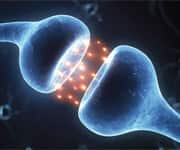
The human brain is capable of forming new connections between neurons. When we take in new information, an electro-chemical signal is sent across the space between neurons (called the synaptic cleft). This ability of the brain to form new connections or neural pathways to communicate with each other is often referred to as brain plasticity.4
Think of it as the ability to learn a new skill, like a dance move. Our brains generate new neural pathways or “wires” to master the particular skill. On the contrary, when these “wires” become faulty or deteriorate, memories start fading and individuals can forget simple things like names or phone numbers.
Brain plasticity is now understood to be at the very foundation of learning and memory.5 This means that changes in memory (including the formation of new memories and learning of new concepts) requires changes in those synaptic connections, hence the term, plasticity.
As you are reading this article, your brain is forming and reforming new neural connections.
With aging, we lose brain plasticity, which results in a loss of cognitive function.6 That’s why a young person, with an active, flexible brain, easily latches on to new ideas and simply thinks faster than an older person whose brain has lost plasticity and is more fixed in its patterns.
As recently as a decade ago, scientists thought that loss of vital brain plasticity was inevitable due to age.
But this traditional view has been challenged.
Recent studies have shown that increasing brain magnesium levels can reverse deteriorating brain plasticity. The result is considerable restoration of cognitive function both in healthy adults and in those with neurodegenerative diseases.9
What You Need to Know
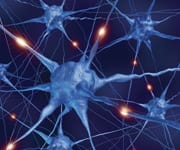 |
Magnesium Improves Brain Plasticity
- Brain plasticity, the ability to remodel connections between brain cells, is the physical foundation of memory and cognition.
- Loss of memory and cognitive function in old age and in neurodegenerative diseases is the result of lost brain plasticity.
- Studies show that raising brain magnesium levels restores lost plasticity and improves cognitive function in aging animals and in models of neurodegenerative diseases.
- But conventional magnesium supplements fail to significantly raise brain magnesium levels.
- A novel form of magnesium, magnesium-L-threonate, has been developed, which is capable of rapid absorption and superior delivery to brain tissue, raising brain magnesium levels by up to 15%.
- Animal studies reveal marked and significant improvements in memory, learning, and cognition with magnesium-L-threonate supplementation, and lab studies show corresponding improvements in synaptic structures that correlate with improved brain plasticity.
- New human data shows promising results in older adults with cognitive impairment after supplementing with magnesium-L-threonate.
- Regular supplementation with magnesium-L-threonate is essential for anyone concerned about age-related loss of cognitive function or neurodegenerative diseases.
The Magnesium Connection
Magnesium is absolutely critical for maintaining healthy brain plasticity. This is because magnesium regulates how brain cells form those critical connections that are the foundation of learning and memory.
In fact, magnesium ions control/block tiny electrical switches (technically, “ion channels”) and intercellular connections ("gap junctions") in brain cells.10,6 These electrical signals in turn, regulates the structural and functional connections between cells including the formation of new memories and the damage to brain cells when signaling is continuously too strong due to the loss of regulation from magnesium ions. Thus, magnesium concentrations are an essential part of brain plasticity—the ability to add, remove, or revise cell-to-cell connections to regulate learning and memory.
Numerous studies demonstrate the dangerous impact of insufficient magnesium on brain health.10,11,12 Lab studies show us that depriving brain cells of sufficient magnesium impairs their ability to participate in optimal plasticity.11,13 In animals and humans, we are now able to see that this loss of plasticity leads directly to a poorer performance on tests of memory.14,15
The reason memory is impacted is because low levels of magnesium creates overactivation of the ion channels involved in signaling which results in damage to brain cells and decreases in the strengthening of connections between brain cells that lead to memory formation.11
In addition to impacting memory, in mice chronically low calcium and magnesium levels in the diet have also been shown to correlate with a high incidence of neurodegenerative diseases.12
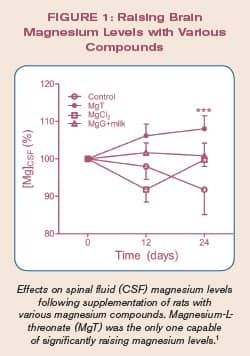
Basic lab studies have shown that boosting magnesium concentrations at excitatory synapses can enhance brain plasticity.16 In brain cells cultured from the hippocampus (the part of the brain where we store and retrieve memories), these changes led to long-term enhancements of brain plasticity, demonstrating long-lasting improvement.16 (It is important to note that the levels of magnesium needed to improve plasticity are well within the normal physiological range, not exceedingly high.)
Studies in Alzheimer’s animal model with insulin resistance provide further support for magnesium's ability to reverse losses in brain plasticity and restore cognitive function.13
Like diabetic humans, these rats have a high risk of developing Alzheimer’s disease. Researchers found that elevating brain magnesium levels with injected magnesium protected learning and memory in diabetic rats with spontaneous Alzheimer’s-like symptoms. Elevating brain magnesium levels also reversed impairments in synaptic function and long-term potentiation (the cellular equivalent of learning).13
These studies make it clear that elevating brain levels of magnesium helps to improve cognition by improving plasticity (the malleability of connections between brain cells) and long-term potentiation (the strengthening of connections).
But, one of the biggest challenges that researchers have encountered is delivering sufficient amounts of magnesium into the brain. Fortunately, scientists at the Massachusetts Institute of Technology (MIT) have found a solution.
A Breakthrough Form of Magnesium
Scientists at MIT set out to develop a better-absorbed form of magnesium that also could boost concentrations of the mineral in the brain.1 After testing several compounds, they found what they were looking for in a unique compound called magnesium-L-threonate. This is a complex of magnesium along with threonic acid, a breakdown product of vitamin C.1
Figure 1 shows the results of treating rats with magnesium-L-threonate (MgT) compared with untreated control animals and with those supplemented with two other forms of magnesium.1 Only magnesium-L-threonate proved capable of significantly raising magnesium levels in spinal fluid, which is a measure of brain magnesium.1
Magnesium-L-threonate’s effects were even more remarkable on short- and long-term memory performance in live rats (Figure 2). Compared with the other forms of magnesium, the animals that were supplemented with magnesium-L-threonate demonstrated significantly greater memory retention over 10 minutes and 12 hours (Refer to Figure 2 charts on next page).1
In addition to these short- and long-term memory improvements, rats supplemented with magnesium-L-threonate demonstrated enhanced learning abilities and enhanced working memory, which are essential for overall normal cognitive function.1
Furthermore, in aged rats, supplemented with Magnesium-L-threonate were better at pattern completion (ability to retrieve memories based on incomplete information) compared with control animals.1
Examination of the brain tissue provided the explanation for these dramatic functional improvements. The rats supplemented with magnesium-L-threonate had higher densities of synaptic proteins associated with memory formation, especially in the hippocampus. These findings correlated with the animals’ improved memory performance on testing.1
In addition, the magnesium increased the number of release sites at the presynaptic nerve endings and reduced their overall probability of releasing neurotransmitters. This reconfiguration enabled synapses to more finely tune their transmissions, resulting in greater plasticity. The synapses were, in effect, “trained” to respond only to the “right” stimuli, producing improved memories in the live animals.1
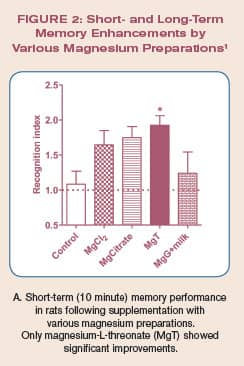
Finally, the increase in brain magnesium levels enhanced long-term potentiation, which is the process that refers to the strengthening of connections between brain cells based on recent patterns of activity that is associated with enhanced learning and memory.1,11
Alzheimer’s Disease
The ability of magnesium-L-threonate to enhance brain plasticity is of tremendous interest to researchers studying Alzheimer’s disease. As tangles of toxic beta amyloid protein develop in Alzheimer’s patients, they trigger brain cell death and the loss of brain synapses. 9,17,18 This hinders brain plasticity and ultimately impairs cognition.
Magnesium-L-threonate has now been tested in a widely accepted mouse model of Alzheimer’s disease. In this type of study, mice are genetically modified to develop brain structural problems and cognitive defects that closely resemble those in human Alzheimer’s.9
When the researchers treated mice early in their disease progression with magnesium-L-threonate, it prevented the loss of synapses and the decline of memory that occurred in untreated animals. The magnesium supplemented animals showed these effects even when the magnesium-L-threonate was given at the end-stage of their cognitive decline.17
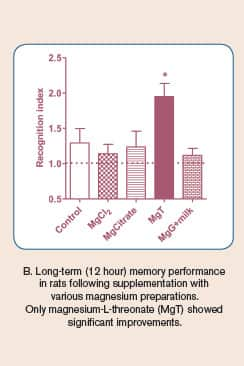
This impressive result might be related to magnesium’s ability to help prevent and clear the accumulation of toxic beta amyloid plaques. In another Alzheimer’s animal study, magnesium-L-threonate supplementation suppressed the expression of the enzyme responsible for beta amyloid deposits by an impressive 80% resulting in significant inhibition of beta amyloid aggregation (a hallmark of Alzheimer’s disease).19
The researchers proposed that, based on these results, magnesium could play a role in the prevention of Alzheimer’s.19
New Findings for Post-Traumatic Stress Disorder
While Alzheimer’s is the most urgent demonstration of restoration of brain plasticity by magnesium-L-threonate, it is far from the only potential application for this supplement.
Researchers also found that magnesium-L-threonate has beneficial effects for those suffering from post-traumatic stress disorder (PTSD).7
Sometimes when our brains form connections, they aren’t good ones. For example, certain objects or events can be associated with harmful stimuli (technically termed “fear conditioning”).20 After these fear conditioning memories are formed, the objects or events can trigger fear memories even when presented alone without the actual harmful stimulus. In animals and healthy people, these fear memories naturally fade with time as the object triggering them is experienced in a safe environment. (Perhaps this is the likely scientific explanation for the phrase “time heals all wounds.”)
For example, if you experienced a house fire, hearing fire engines could reproduce the feelings of fear experienced from the fire itself. In time, that feeling will fade when the triggering event is experienced in a safe environment. But this requires brain plasticity.
Unfortunately, in people who suffer from post-traumatic stress disorder, that fear response does not fade with time. This is likely due to the fact that post-traumatic stress disorder induces a sharp reduction in brain plasticity.21-24
Exciting research has demonstrated that magnesium-L-threonate can help speed up this recovery process in people suffering from post-traumatic stress disorder.
Scientists studied magnesium-L-threonate in rats with conditioned fear responses (the animal equivalent of post-traumatic stress disorder). Amazingly, the magnesium-L-threonate treatment helped the fear memory fade with time, without impacting the original memory.7
Research shows that magnesium-L-threonate enhances brain plasticity in specific regions of the brain most affected by traumatic events.7 Because of these impressive animal results, scientists are proposing that magnesium could be a novel supplement for people suffering from post-traumatic stress disorder, anxiety, or depression.7
What Is Magnesium?
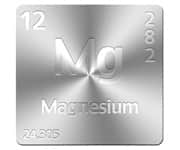 |
Magnesium, the fourth most abundant mineral in the body, is known to be a co-factor for more than 300 reactions catalyzed by enzymes, including those essential for energy release from food and conversion to cellular work through formation of adenosine triphosphate, or ATP, in mitochondria. Magnesium is also required for the synthesis of DNA and RNA.25
Magnesium is especially important in all of our bodies’ electrical and electrochemical activities, including muscle contractions, heart rhythm, nerve conduction, and brain cell activity.25
The most common disturbance of magnesium in our bodies called hypomagnesemia, or low blood magnesium levels is widely recognized as a cause of seizures, hypertension, stroke, migraine headaches, attention deficit hyperactivity disorder, and metabolic conditions such as insulin resistance and type II diabetes.25
In addition to all of these known functions, magnesium has been found to be an essential factor in regulating synaptic plasticity in the brain, which is the physical structural change that underlies what we perceive as learning and memory.1
Recent Human Study
A randomized double-blind placebo-controlled human study on magnesium-L-threonate was released late in 2015 with compelling results that corroborate and extend on the previous findings in vivo.2
Men and women aged 50 to 70, with self-reported cognitive problems (e.g., memory and concentration) anxiety and sleep disorder were enrolled in the study. They were randomly assigned to receive either placebo or a supplement containing magnesium-L-threonate. Subjects took 1.5 grams per day of the supplement if they weighed less than 154 pounds, and 2 grams per day if they weighed more.
Subjects were evaluated before starting the supplement and again at weeks 6 and 12 (end of the study). At each evaluation, subjects participated in a series of reliable standardized tests to assess cognitive deficits and improvements, while blood and urine tests were performed to calculate total body magnesium status.2
By 12 weeks, lab results showed that magnesium-L-threonate was effective at loading magnesium into the body, as well as into cells (red blood cells were used because sampling cerebral spinal fluid CSF or brain cells in humans is highly invasive).2
This form of magnesium was shown to be effective at loading magnesium into the brain and at enhancing brain function. This was made clear by results of cognitive testing. Already by week six, supplemented subjects demonstrated significantly increased perfomance speed in tests of executive function (e.g., reasoning, problem-solving, and planning). By week 12, that increased speed reached an approximate 20% improvement over baseline, while placebo recipients experienced no significant change.2
There was also a significant 13.1% improvement in supplemented subjects’ working memory (the memory we use, for example, to remember where we put things) and a significant 37.6% improvement in episodic memory (for example, the ability to put new faces and names together). And composite scores of overall cognitive abilities rose significantly from baseline and compared with placebo at both weeks 6 and 12.2
Tellingly, magnesium loading into red blood cells was significantly correlated with enhancement in overall cognitive ability in supplemented patients. This was a strong validation of earlier animal studies in which raising brain magnesium levels boosted cognitive function.1
An unexpected benefit was also demonstrated when the researchers examined fluctuations in cognitive performance over time. Such a fluctuation is known to be an early sign of impending cognitive impairment.9,26 Not only did supplemented patients experience less cognitive fluctuation, but the changes that they did experience were primarily positive (performing better than usual).
All of these data provide impressive support for the use of magnesium-L-threonate to improve cognitive function. Another impressive result comes with an analysis of the clinical significance of this study in the context of normal brain aging.
The researchers compared the current study results with data from a previous study in age-matched cognitively normal subjects. They determined that performance on Trail Making Test (TMT-B) which assesses executive function as well as impulsivity, visual search, visual attention, and motor speed falls about 1.04% per year in the cognitive normal subjects. Baseline performance in the current study was about 10% lower than that of age-matched cognitively normal controls, confirming that subjects in the current study indeed had executive function decline. But after 12 weeks of supplementation, the average increase in performance was 10.3%, essentially restoring performance to that of age-matched people without cognitive decline.2
Next researchers used the normal cognition study to assign a “brain age” to each of their own study subjects. Using this calculation, for example, a 50-year-old with a 10% performance deficit on cognitive testing would have a brain age equivalent to that of a cognitively normal 60-year-old (at a rate of approximately 1% function loss per year).2
By this calculation, the average chronological age of subjects was 57.8 years, while their average brain age was 68.3 years at the beginning of the study. After 12 weeks there was an average of 9.4 years improvement in brain age in the supplemented group, while placebo recipients brain age improved by less than a year.2
In other words, supplementation with magnesium-L-threonate resulted in an effective reversal of brain age to near normal. The brain age reversal in subjects who had a significant increase in red blood cell magnesium was even higher, at 14.6 years, moving those individuals into a potentially younger brain age than their actual age in years!
Summary
The loss of brain plasticity is at the heart of age-related loss of cognitive function. As our brains lose flexibility, we lose the ability to learn new concepts, to make sharp judgments, and to develop new skills.
Loss of brain plasticity is implicated in both the “natural” loss of brain function with aging as well as with accelerated cognitive decline as seen in Alzheimer’s and other neurodegenerative diseases.
Restoring brain plasticity has become a major focus of neuroscientists aiming to slow or eliminate the loss of brain function over time.
Animal and human studies show that boosting brain magnesium levels can rescue the ability of brain cells to form new memories and discriminate between existing ones. But conventional magnesium supplements do not effectively raise brain magnesium levels.
The development of magnesium-L-threonate appears to have shattered that barrier. Studies show that this compound enters brain tissue more effectively than other magnesium formulations, and is significantly more effective at restoring memory functions and brain plasticity in several animal models, including those of Alzheimer’s disease.
Recent human data on magnesium-L-threonate shows promising results in older adults with cognitive impairment. Those interested in preventing cognitive decline and in restoring active, flexible brain connections should consider daily supplementation with magnesium-L-threonate. No other magnesium preparation comes close to its performance.
If you have any questions on the scientific content of this article, please call a Life Extension® Health Advisor at 1-866-864-3027.
References
- Slutsky I, Abumaria N, Wu LJ, et al. Enhancement of learning and memory by elevating brain magnesium. Neuron. 2010 Jan 28;65(2):165-77.
- Liu G, Weinger JG, Lu ZL, et al. Efficacy and Safety of MMFS-01, a Synapse Density Enhancer, for Treating Cognitive Impairment in Older Adults: A Randomized, Double-Blind, Placebo-Controlled Trial. J Alzheimers Dis. 2016;49(4):971-90.
- Mickley GA, Hoxha N, Luchsinger JL, et al. Chronic dietary magnesium-L-threonate speeds extinction and reduces spontaneous recovery of a conditioned taste aversion. Pharmacol Biochem Behav. 2013 May;106:16-26.
- Fuchs E, Flugge G. Adult neuroplasticity: more than 40 years of research. Neural Plast. 2014;2014:541870.
- Mahncke HW, Bronstone A, Merzenich MM. Brain plasticity and functional losses in the aged: scientific bases for a novel intervention. Prog Brain Res. 2006;157:81-109.
- Wang D, Jacobs SA, Tsien JZ. Targeting the NMDA receptor subunit NR2B for treating or preventing age-related memory decline. Expert Opin Ther Targets. 2014 Oct;18(10):1121-30.
- Abumaria N, Yin B, Zhang L, et al. Effects of elevation of brain magnesium on fear conditioning, fear extinction, and synaptic plasticity in the infralimbic prefrontal cortex and lateral amygdala. J Neurosci. 2011 Oct 19;31(42):14871-81.
- Basheer MP PKK, Sreekumaran E, et al. A study of serum magnesium, calcium and phosphorus level, and cognition in the elderly population of South India. Alexandria J Med.
- Li W, Yu J, Liu Y, et al. Elevation of brain magnesium prevents synaptic loss and reverses cognitive deficits in Alzheimer's disease mouse model. Mol Brain. 2014 Sep 13;7:65.
- Palacios-Prado N, Chapuis S, Panjkovich A, et al. Molecular determinants of magnesium-dependent synaptic plasticity at electrical synapses formed by connexin36. Nat Commun. 2014 Aug 19;5:4667.
- Danysz W, Parsons CG. The NMDA receptor antagonist memantine as a symptomatological and neuroprotective treatment for Alzheimer's disease: preclinical evidence. Int J Geriatr Psychiatry. 2003Sep;18(Suppl 1):S23-32.
- Taniguchi R, Nakagawasai O, Tan-no K, et al. Combined low calcium and lack magnesium is a risk factor for motor deficit in mice. Biosci Biotechnol Biochem. 2013;77(2):266-70.
- Xu ZP, Li L, Bao J, et al. Magnesium protects cognitive functions and synaptic plasticity in streptozotocin-induced sporadic Alzheimer's model. PLoS One. 2014;9(9):e108645.
- Murphy T, Dias GP, Thuret S. Effects of diet on brain plasticity in animal and human studies: mind the gap. Neural Plast. 2014;2014:563160.
- Bilbo SD, Smith SH, Schwarz JM. A lifespan approach to neuroinflammatory and cognitive disorders: a critical role for glia. J Neuroimmune Pharmacol. 2012 Mar;7(1):24-41.
- Slutsky I, Sadeghpour S, Li B, et al. Enhancement of synaptic plasticity through chronically reduced Ca2+ flux during uncorrelated activity. Neuron. 2004 Dec 2;44(5):835-49.
- Yu J, Sun M, Chen Z, et al. Magnesium modulates amyloid-beta protein precursor trafficking and processing. J Alzheimers Dis. 2010;20(4):1091-106.
- Bisel BE, Henkins KM, Parfitt KD. Alzheimer amyloid beta-peptide A-beta25-35 blocks adenylate cyclase-mediated forms of hippocampal long-term potentiation. Ann N Y Acad Sci. 2007 Feb;1097:58-63.
- Yu X, Guan PP, Guo JW, et al. By suppressing the expression of anterior pharynx-defective-1alpha and -1beta and inhibiting the aggregation of beta-amyloid protein, magnesium ions inhibit the cognitive decline of amyloid precursor protein/presenilin 1 transgenic mice. FASEB J. 2015 Dec;29(12):5044-58.
- Maren S. Neurobiology of Pavlovian fear conditioning. Annu Rev Neurosci. 2001;24:897-931.
- Chao LL, Tosun D, Woodward SH, et al. Preliminary Evidence of Increased Hippocampal Myelin Content in Veterans with Posttraumatic Stress Disorder. Front Behav Neurosci. 2015;9:333.
- Cominski TP, Jiao X, Catuzzi JE, et al. The role of the hippocampus in avoidance learning and anxiety vulnerability. Front Behav Neurosci. 2014;8:273.
- Powers MB, Medina JL, Burns S, et al. Exercise Augmentation of Exposure Therapy for PTSD: Rationale and Pilot Efficacy Data. Cogn Behav Ther. 2015;44(4):314-27.
- Wingo AP, Almli LM, Stevens JS, et al. DICER1 and microRNA regulation in post-traumatic stress disorder with comorbid depression. Nat Commun. 2015 Dec 3;6:10106.
- Grober U, Schmidt J, Kisters K. Magnesium in Prevention and Therapy. Nutrients. 2015 Sep 23;7(9):8199-226.
- Palop JJ, Chin J, Mucke L. A network dysfunction perspective on neurodegenerative diseases. Nature. 2006 Oct 19;443(7113):768-73.

